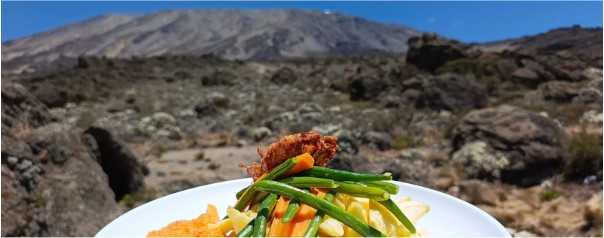In East Africa, that story is written in ugali — a simple maize porridge that powers farmers through long days and climbers up steep slopes. It’s plain, humble, and perfect. When you eat it on the mountain, surrounded by air thin enough to taste, you realise that nourishment is more than calories. It’s continuity.
Climbers ascending Africa’s highest peak with Team Kilimanjaro quickly learn that food becomes ritual. Breakfast is not a buffet; it’s strategy. Each bowl of porridge or handful of peanuts is a promise your body makes to your willpower. At 4,000 metres, the most comforting spice is warmth itself.

Meals on the mountain mirror the diversity of the continent.
There’s Tanzanian stew thick with cumin and tomato; chapati sizzling on a makeshift pan; sweet tea that revives conversation when words freeze in the cold. The cooks — often the most beloved members of any expedition — perform quiet alchemy, turning limited ingredients into morale. Their creativity proves that endurance and hospitality are cousins.
The psychology of altitude affects appetite, too. As oxygen thins, digestion slows, and climbers must plan to eat, not merely wait for hunger. Understanding the time needed for the ascent includes planning how long energy reserves last, how flavours motivate, and how a familiar dish can steady a trembling heart.

For those who love food, the lesson is simple and profound: flavour remembers context. The same stew that tastes ordinary at sea level becomes sacred when shared above the clouds. And perhaps that is what cuisine, travel, and faith all share — they remind us that the most ordinary ingredients, blessed by effort and gratitude, can lift the spirit higher than any summit.
